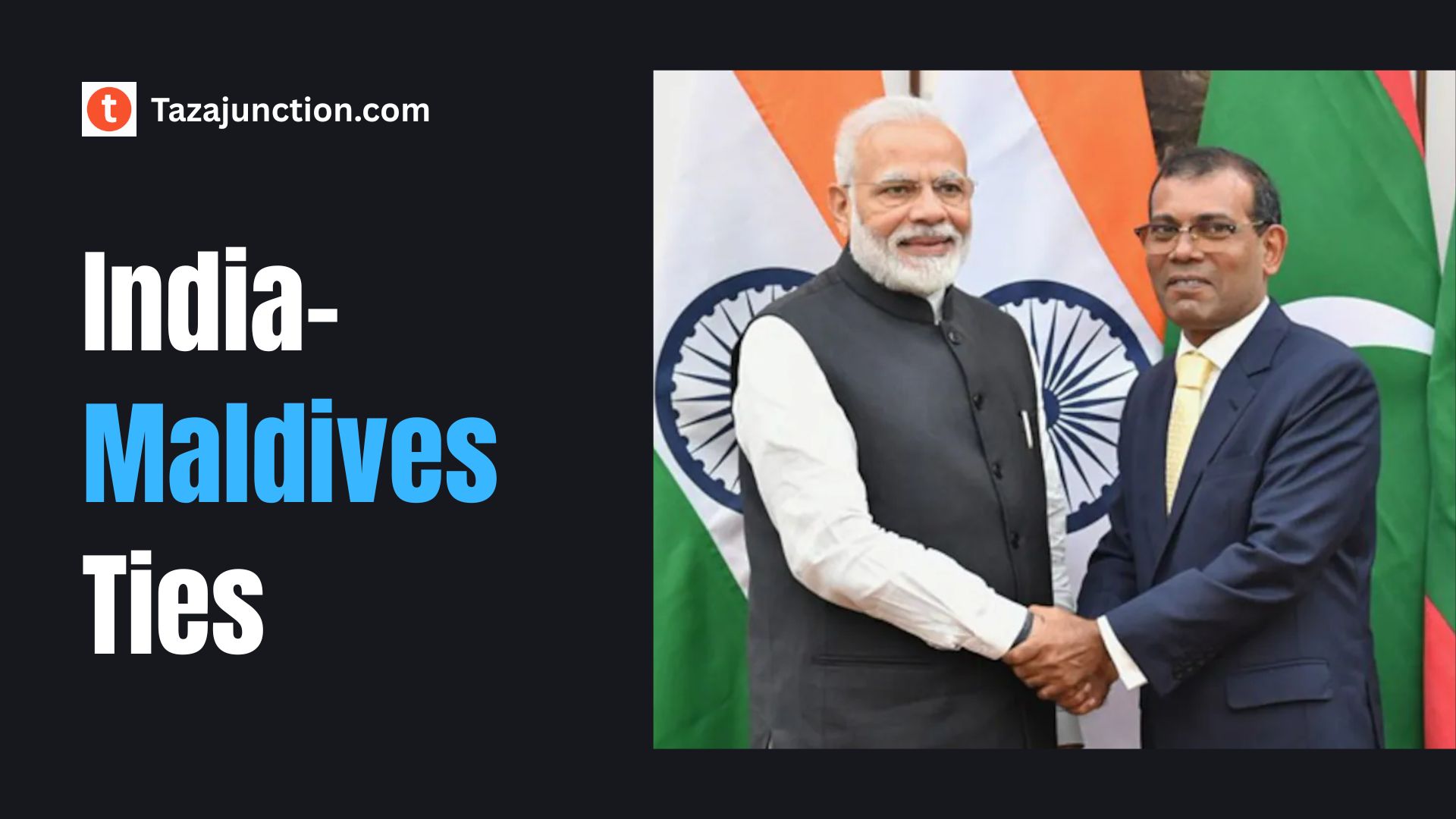As Prime Minister Narendra Modi prepares for his highly anticipated visit to the Maldives, former Maldives President Mohamed Nasheed has underscored the immense significance of strengthening India-Maldives ties.
Nasheed, a prominent political leader and global climate advocate, believes that robust India Maldives ties are crucial not only for bilateral cooperation but also for regional stability, economic development, and addressing environmental challenges.
The relationship between India and the Maldives has experienced multiple phases over the years. However, recent developments have set a promising tone for enhanced cooperation.
Nasheed’s insights ahead of PM Modi’s visit reveal how both countries are poised to deepen their partnership and collaborate on diverse fronts that extend beyond traditional diplomacy.
Also you can check the India-UK Free Trade Deal marks a significant milestone in the economic relationship between India and the United Kingdom.
Table of Contents
The Historical Context of India-Maldives Ties
Understanding the importance of India-Maldives ties requires reflecting on the historical and strategic bonds that unite the two nations. The Maldives, a small island nation strategically located in the Indian Ocean, has historically maintained close ties with India due to geographic proximity, shared cultural values, and mutual interests.
Nasheed recalls periods where these ties were strained due to varying political alignments, but he emphasizes that the core of the relationship has always been rooted in mutual respect and collaboration. In recent years, efforts from both sides have helped reinforce India-Maldives ties by focusing on shared challenges and opportunities.
Economic Cooperation: A Cornerstone of India-Maldives Ties
One of the most vital aspects highlighted by Mohamed Nasheed concerning India-Maldives ties is economic cooperation. The Maldives, heavily reliant on tourism and fisheries, has benefited from India’s financial assistance and investments in critical infrastructure. Nasheed has credited India with providing essential support during times of economic uncertainty.
India’s role in helping the Maldives avoid a potential debt crisis showcased the strength of India-Maldives ties. This economic backing has helped stabilize the Maldivian economy, enabling it to continue growing and developing.
Nasheed expects that PM Modi’s visit will reinforce this partnership, leading to more investments in infrastructure, renewable energy, and connectivity projects that serve both nations’ long-term goals.
The development of the Hanimadhoo International Airport, funded by India, is one such project set to enhance the Maldives’ connectivity to India’s southern states. This initiative is a testament to the practical benefits of strong India-Maldives ties, facilitating not only tourism but also business and cultural exchange.
Also you want to know about Income Tax return then read our article. This article provides a complete guide on the start date of ITR filing, who needs to file, the due dates, document checklist, common mistakes, and the importance of filing early.
Security and Strategic Importance of India-Maldives Ties

Security cooperation is another pivotal pillar of India-Maldives ties. The Maldives’ strategic location along major Indian Ocean shipping lanes makes it an important partner for India in safeguarding maritime security. Nasheed has consistently stressed the importance of close coordination on regional security issues.
Through joint naval exercises, intelligence sharing, and counter-piracy operations, India-Maldives ties have grown stronger in maintaining peace and stability in the Indian Ocean region. Nasheed believes that these efforts not only protect both nations’ interests but also contribute to broader regional security frameworks.
With growing geopolitical competition in the Indian Ocean, the importance of India-Maldives ties in ensuring a stable, secure maritime environment cannot be overstated. Nasheed has urged both countries to expand this cooperation to address emerging threats such as terrorism, trafficking, and natural disasters.
Political Consensus and India-Maldives Ties
Another significant factor Nasheed highlights is the growing political consensus in the Maldives supporting close India-Maldives ties. Despite domestic political shifts and changing governments, there appears to be a broad agreement on the importance of maintaining and deepening relations with India.
Nasheed notes that this consensus is driven by a pragmatic understanding that India is an indispensable partner for the Maldives’ development and security. Across political divides, leaders recognize that strengthening India Maldives ties is in the best interest of the nation and the region as a whole.
This bipartisan support is critical for ensuring the sustainability of initiatives launched during PM Modi visit and beyond, allowing both nations to plan for the future with confidence.
Tourism: A Bridge in India-Maldives Ties
Tourism serves as a vital economic link between India and the Maldives, and it is one of the most visible facets of India-Maldives ties. India is the largest source of tourists for the Maldives, and this people-to-people connection strengthens cultural understanding and economic cooperation.
Nasheed has expressed optimism that PM Modi’s visit will lead to increased efforts to promote tourism between the two countries. He pointed out that improved air connectivity, supported by Indian investments, will play a crucial role in this growth.
As tourism flourishes, so too will opportunities for joint ventures, hospitality collaborations, and cultural exchanges, all of which fortify India-Maldives ties and create a foundation for deeper cooperation in other sectors.
Environmental Cooperation and Climate Change: A Key Area of India-Maldives Ties
As a renowned climate advocate, Mohamed Nasheed has long emphasized the urgency of addressing climate change, especially for vulnerable island nations like the Maldives. He highlights environmental cooperation as a critical dimension of India Maldives ties.
The Maldives faces existential threats from rising sea levels, coral bleaching, and extreme weather events. Nasheed believes that India’s leadership in renewable energy and sustainability initiatives can support the Maldives in mitigating these challenges.
Joint efforts in disaster management, clean energy projects, and marine conservation are integral to strengthening India-Maldives ties in the environmental arena. PM Modi’s visit is expected to reinforce commitments in this area, facilitating knowledge exchange and funding for climate resilience.
Cultural and Educational Exchange Enhances India-Maldives Ties
Beyond economics and security, India-Maldives ties are enriched by cultural and educational exchanges. These initiatives foster deeper people-to-people bonds, which Nasheed believes are the bedrock of lasting bilateral relations.
Scholarship programs, cultural festivals, and collaborative academic research strengthen mutual understanding and create opportunities for young Maldivians and Indians alike. Nasheed advocates for expanding these programs as part of the broader effort to enhance India Maldives ties.
Challenges and the Road Ahead for India-Maldives Ties
While Mohamed Nasheed remains optimistic about the future of India-Maldives ties, he acknowledges challenges that both nations must navigate. These include managing geopolitical competition in the region, addressing economic vulnerabilities, and ensuring sustainable development.
Nasheed calls for continuous dialogue, transparency, and shared vision to overcome these obstacles. He believes that the foundation laid by India Maldives ties will allow both countries to collaborate effectively and maintain regional peace and prosperity.
Conclusion
Mohamed Nasheed’s reflections on India Maldives ties ahead of PM Modi’s visit provide valuable insights into the multifaceted nature of this bilateral relationship.
From economic cooperation and security collaboration to environmental sustainability and cultural exchange, the ties between India and the Maldives are comprehensive and growing stronger.
PM Modi’s upcoming visit is expected to further consolidate these ties, opening new avenues for partnership and mutual growth.
As both countries navigate the complexities of the 21st century, India Maldives ties will remain a cornerstone of their foreign policies, ensuring a prosperous and secure future for the region.



